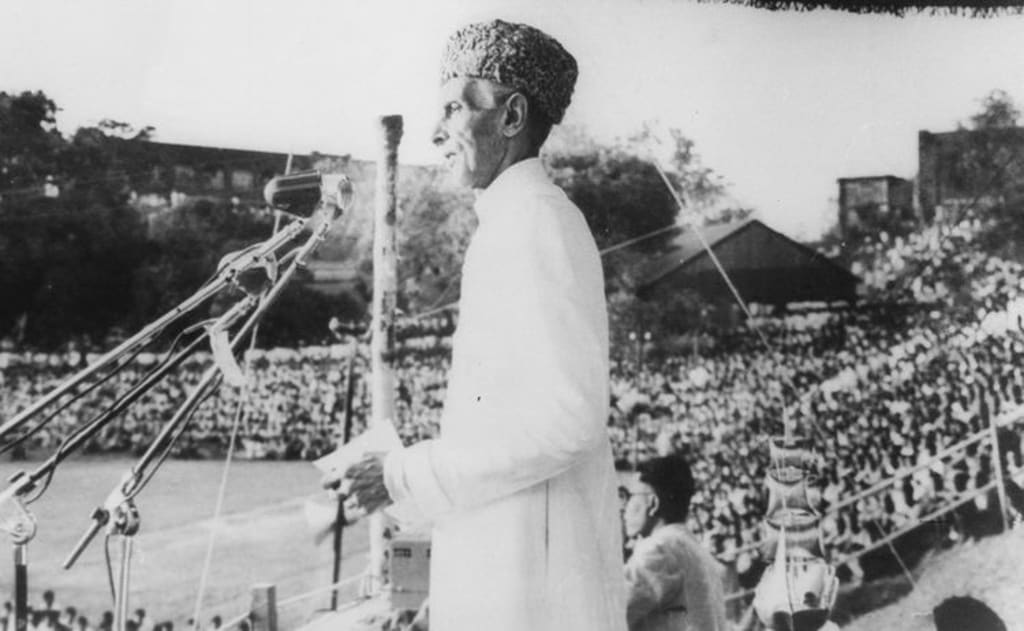
The history of the Islamic Republic of Pakistan began on 14 August 1947 when the country came into being in the form of Dominion of Pakistan within the British Commonwealth as the result of Pakistan Movement and the partition of India. While the history of the Pakistani Nation according to the Pakistan government's official chronology started with the Islamic rule over Indian subcontinent by Muhammad bin Qasim which reached its zenith during Mughal Era. In 1947, Pakistan consisted of West Pakistan (today's Pakistan) and East Pakistan (today's Bangladesh). The President of All-India Muslim League and later the Pakistan Muslim League, Muhammad Ali Jinnah became Governor-General while the secretary general of the Muslim League, Liaquat Ali Khan became Prime Minister. The constitution of 1956 made Pakistan an Islamic democratic country.
Pakistan faced a civil war and Indian military intervention in 1971 resulting in the secession of East Pakistan as the new country of Bangladesh. The country has also unresolved territorial disputes with India, resulting in four conflicts. Pakistan was closely tied to the United States in Cold War. In the Afghan-Soviet War, it supported the Sunni Mujahideens and played a vital role in the defeat of Soviet Forces and forced them to withdraw from Afghanistan. Pakistan faced problems including terrorism, poverty, illiteracy, corruption and political instability. Terrorism due to War of Afghanistan damaged the country's economy and infrastructure to a great extent from 2001 to 2009 but Pakistan is once again developing.
Pakistan is a nuclear power as well as a declared nuclear-weapon state, having conducted six nuclear tests in response to five nuclear tests of their rival Republic of India in May 1998. The first five tests were conducted on 28 May and the sixth one on 30 May. With this status, Pakistan is seventh in world, second in South Asia and the only country in the Islamic World. Pakistan also has the sixth-largest standing armed forces in the world and is spending a major amount of its budget on defense. Pakistan is the founding member of the OIC, the SAARC and the Islamic Military Counter Terrorism Coalition as well as a member of many international organisations including the UN, the Shanghai Cooperation Organisation, the Commonwealth of Nations, the ARF, the Economic Cooperation Organization and many more.
Pakistan is a regional and middle power which is ranked among the emerging and growth-leading economies of the world and is backed by one of the world's largest and fastest-growing middle class. It has a semi-industrialized economy with a well-integrated agriculture sector.
More than ten million people migrated across the new borders and between 200,000 and 2,000,000 people died in the spate of communal violence in the Punjab in what some scholars have described as a 'retributive genocide' between the religions. The Pakistani government claimed that 50,000 Muslim women were abducted and raped by Hindu and Sikh men and similarly the Indian government claimed that Muslims abducted and raped 33,000 Hindu and Sikh women. The two governments agreed to repatriate abducted women and thousands of Hindu, Sikh and Muslim women were repatriated to their families in the 1950s. The dispute over Kashmir escalated into the first war between India and Pakistan. With the assistance of the United Nations (UN) the war was ended but it became the Kashmir dispute, unresolved as of 2021.
1947–1958: First democratic era. In 1947, the founding fathers of Pakistan agreed to appoint Liaquat Ali Khan as the country's first prime minister, with Muhammad Ali Jinnah as both first governor-general and speaker of the State Parliament. Mountbatten had offered to serve as Governor-general of both India and Pakistan but Jinnah refused this offer. When Jinnah died of tuberculosis in 1948, Islamic scholar Maulana Shabbir Ahmad Usmani described Jinnah as the greatest Muslim after the Mughal Emperor Aurangzeb.
1958–1971: first military era. In October 1958 President Iskandar Mirza issued orders for a massive mobilisation of the Pakistan Armed Forces and appointed Chief of Army Staff General Ayub Khan as Commander-in-chief. President Mirza declared a state of emergency, imposed martial law, suspended the constitution, and dissolved both the socialist government in East Pakistan and the parliamentary government in West Pakistan.
General Ayub Khan was Chief Martial Law Administrator, with authority throughout the country. Within two weeks President Mirza attempted to dismiss Khan, but the move backfired and President Mirza was relieved of the presidency and exiled to London. General Khan promoted himself to the rank of a five-star field marshal and assumed the presidency. He was succeeded as chief of army staff by General Muhammad Musa. Khan named a new civil-military government under him.
1971–1977: Second democratic era. The 1971 war and the separation of East Pakistan demoralised the nation. With the PPP's assumption of power, democratic socialists and visionaries had authority for the first time in the country's history. Bhutto dismissed the chiefs of the army, navy and the air force and ordered house arrest for General Yahya Khan and several of his collaborators. He adopted the Hamoodur Rahman Commission's recommendations and authorised large-scale courts-martial of army officers tainted by their role in East Pakistan. To keep the country united Bhutto launched a series of internal intelligence operations to crack down on fissiparous nationalist sentiments and movements in the provinces.
1971 to 1977 was a period of left-wing democracy and the growth of economic nationalisation, covert atomic bomb projects, promotion of science, literature, cultural activities and Pakistani nationalism. In 1972 the country's top intelligence services provided an assessment on the Indian nuclear program, concluding that: "India was close to developing a nuclear weapon under its nuclear programme". Chairing a secret seminar in January 1972, which came to be known as "Multan meeting", Bhutto rallied Pakistani scientists to build an atomic bomb for national survival. The atomic bomb project brought together a team of prominent academic scientists and engineers, headed by theoretical physicist Abdus Salam. Salam later won the Nobel Prize in Physics for developing the theory for the unification of the weak nuclear and electromagnetic forces.
The PPP created the 1973 Constitution with the support of Islamists. The Constitution declared Pakistan an Islamic Republic and Islam the state religion. It also stated that all laws would have to be brought into accordance with the injunctions of Islam as laid down in the Quran and Sunnah and that no law repugnant to such injunctions could be enacted. The 1973 Constitution also created institutions such as the Shariat Court and the Council of Islamic Ideology to channel and interpret the application of Islam to the law.
In 1973 a serious nationalist rebellion took place in Balochistan province, which was harshly suppressed; the Shah of Iran purportedly assisted with air support in order to prevent the conflict from spilling over into Iranian Balochistan. Bhutto's government carried out major reforms such as the re-designing of the country's infrastructure, the establishment of the Joint Chiefs of Staff Committee and the reorganisation of the military. Steps were taken to encourage the expansion of the country's economic and human infrastructure, starting with the agriculture, land reforms, industrialisation and the expansion of the higher education system throughout the country. Bhutto's efforts undermined and dismantled the private-sector and conservative approach to political power in the country's political setup. In 1974 Bhutto succumbed to increasing pressure from religious parties and encouraged Parliament to declare adherents of Ahmadiyya to be non-Muslims.
Relations with the United States deteriorated as Pakistan normalised relations with the Soviet Union, the Eastern Bloc, North Korea, China, and the Arab world. With Soviet technical assistance the country's first steel mill was established in Karachi, which proved to be a crucial step in industrialising the economy. Alarmed by India's surprise nuclear test in 1974, Bhutto accelerated Pakistan's atomic bomb project. This crash project led to a secret sub-critical testings, Kirana-I and Test Kahuta, in 1983. Relations with India soured and Bhutto sponsored aggressive measures against India at the United Nations. These openly targeted the Indian nuclear programme.
About the Creator
Adams
writer | artist | chef
Enjoyed the story? Support the Creator.
Subscribe for free to receive all their stories in your feed. You could also pledge your support or give them a one-off tip, letting them know you appreciate their work.





Comments
There are no comments for this story
Be the first to respond and start the conversation.